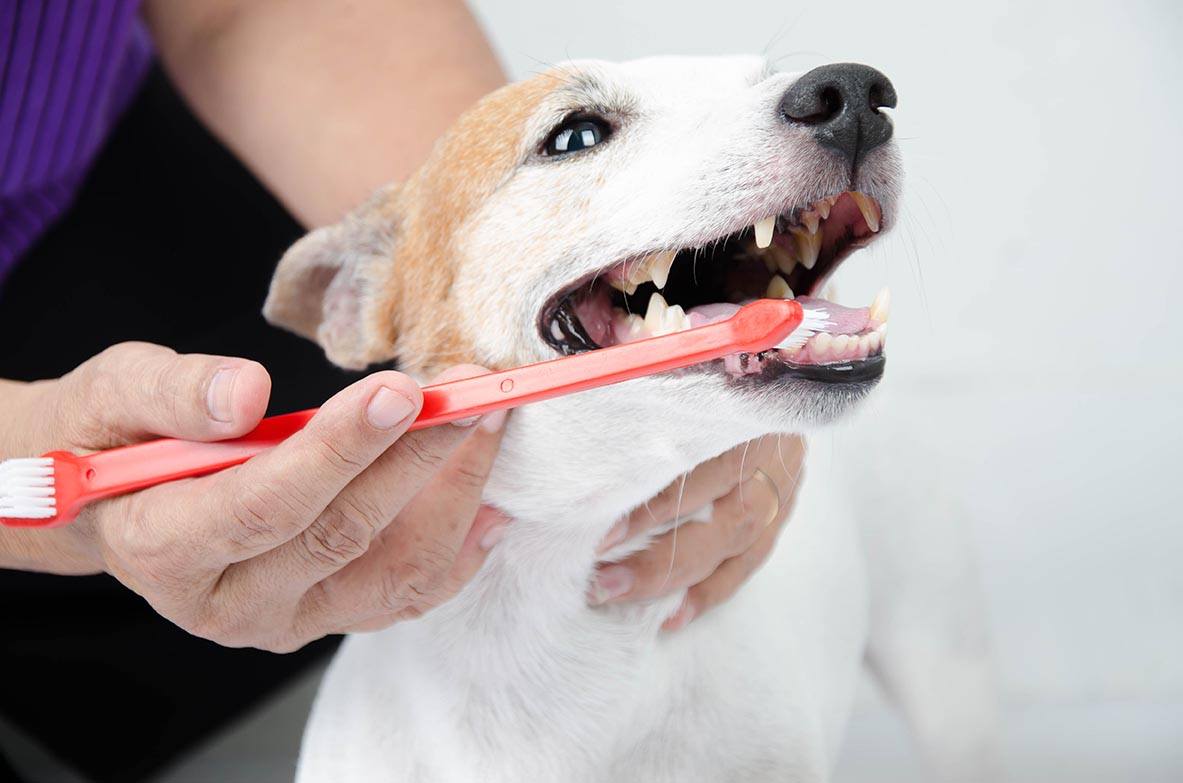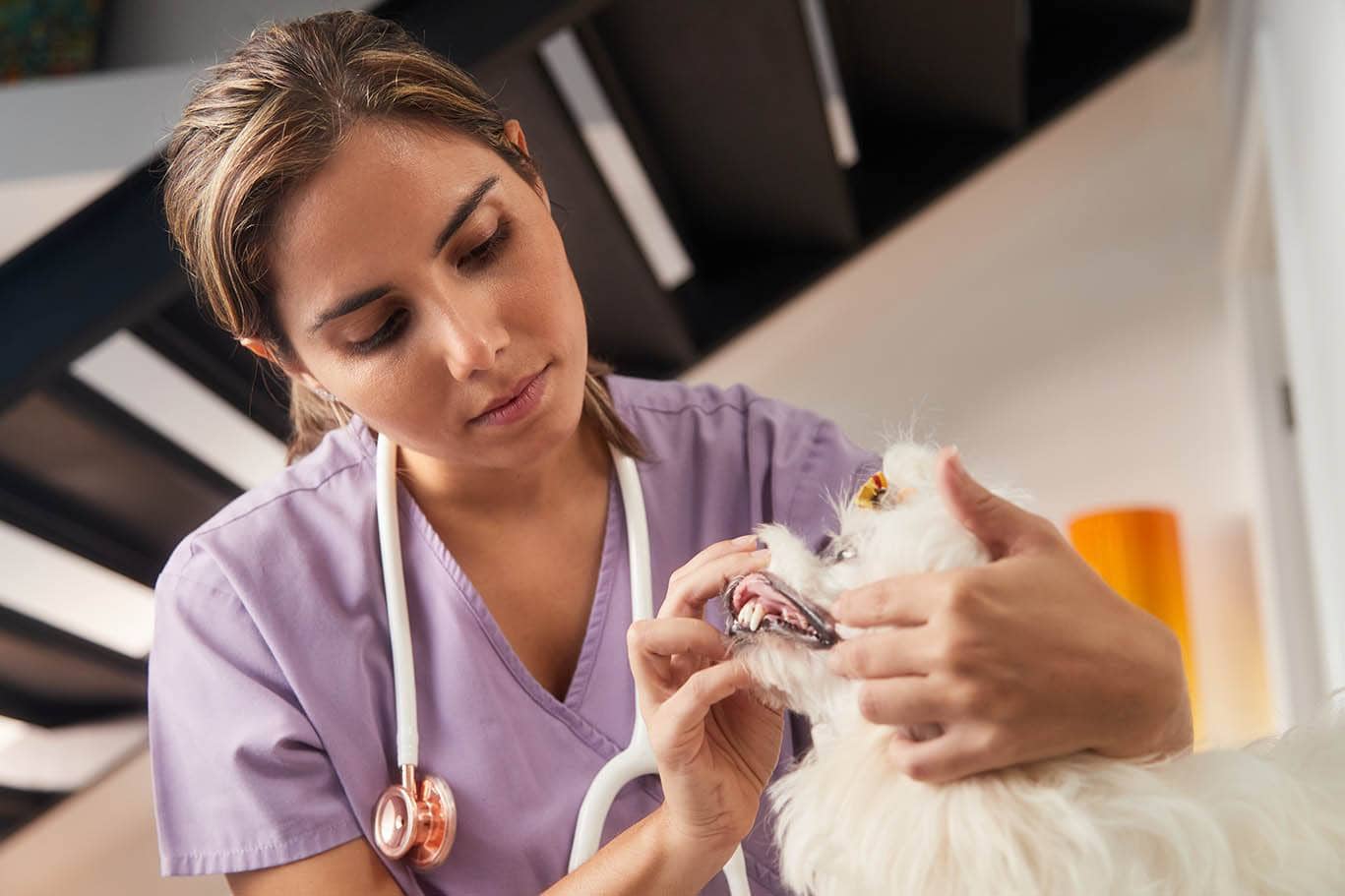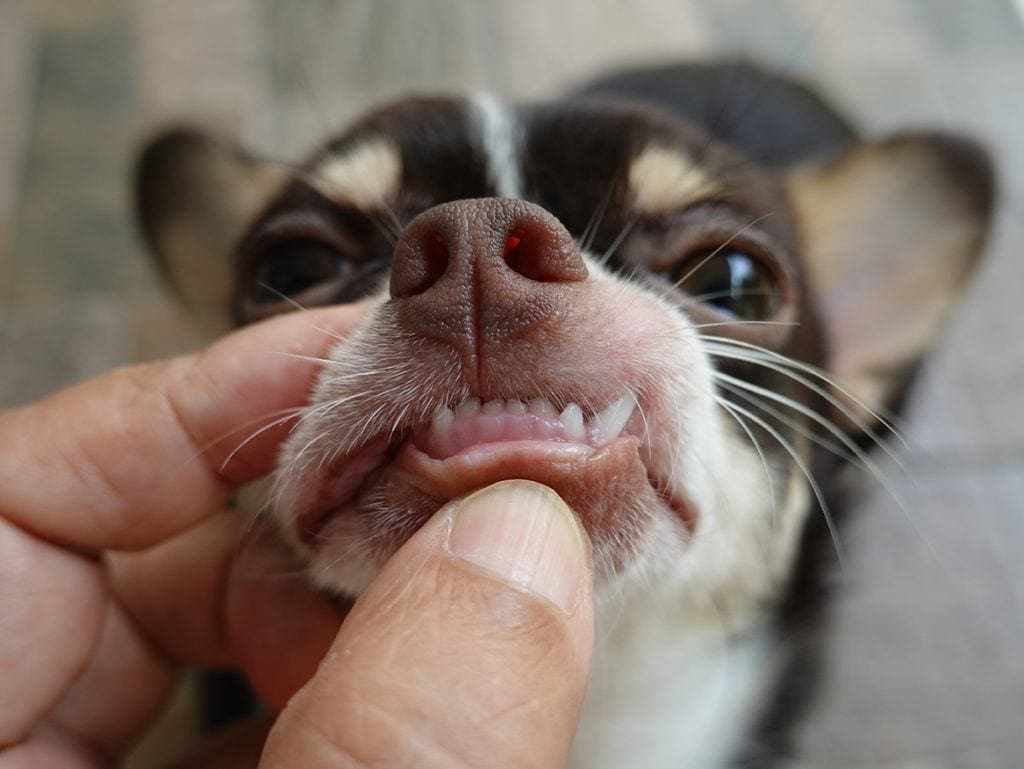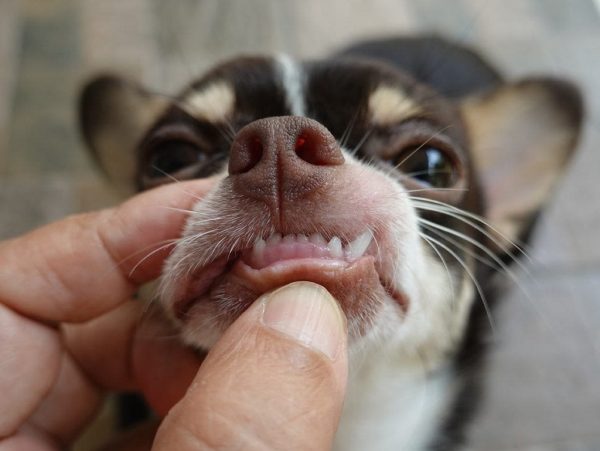You probably know that you need to take care of your teeth, but did you know it is important to care for your dog’s teeth too? Dog dental care is something that is highly important, but many loving dog owners seem to forget about it.
If you are reading this article, congratulations. You are already a step ahead of many other dog owners. In this article, we are going to give you a complete guide to all things dog dental care. This includes knowing what a healthy mouth looks like, keeping your dog’s mouth healthy, and knowing the signs of an unhealthy mouth. Let’s get started.
What Does a Healthy Dog Mouth Look Like?
It’s important to know what a healthy dog mouth looks like so that you can easily note whenever something is wrong. Just like in humans, dogs’ teeth and mouths must be taken care of so that they remain healthy for their entire life.
This may come as a shock to you, but dogs actually have a third more teeth than we have. Dogs have 42 teeth in total. Each one of these teeth should be clean, free of plaque, and free of tartar. The teeth should also not be jagged or broken in any way.
You shouldn’t just look at the teeth, though. You need to look at the entire mouth. Their tongue should be moist without any lumps or cuts. Additionally, the gums should be salmon pink. It is important to note that some dog breeds have black or black and pink gums. If your dog has always had black gums, then that isn’t something you should worry about.

Taking Care of Your Dog’s Oral Health
In order to keep our mouths clean, we brush and floss regularly. Unfortunately, dogs do not have this ability. As a result, it is up to us to ensure that our dogs oral health is as it should be. Here are things you need to do to keep your dog’s mouth healthy.
Brush Your Dog’s Teeth
The most basic thing you should do to take care of your dog’s oral health is to brush its teeth. There are dog-specific toothbrushes and toothpastes on the market. These devices will help to reduce the bacteria specifically found in pets’ mouths. It’s best to brush your dog’s teeth daily.
If you have never brushed your dog’s teeth before, take baby steps. Many dogs don’t like their muzzles touched. So, brushing their teeth can be something they don’t like. Begin by getting your dog used to you touching inside their mouth, such as along their teeth and gums.
Once your dog is comfortable with that, introduce them to the toothbrush. Let them smell it so that they know it isn’t something to be scared of. As your dog gets acclimated to the toothbrush, you can begin to put it in their mouth and brush their teeth.
In order to brush their teeth, you need to lift up your dog’s lips. Start with the front teeth and work your way back. Pay attention to the outside of the tooth specifically. Make sure to only use toothpaste specific for dogs because human toothpaste can make dogs sick.

Get a Routine Cleaning with Your Vet
Humans are recommended to see their dentist every six months for a routine cleaning. Your dog should also have a routine cleaning done at your vet’s office. Your dog’s mouth only needs to be routinely cleaned once a year, not twice.
During the routine cleaning, your dog will be put under anesthesia. From there, the vet will fully clean the pup’s mouth, including underneath the gums. The vet may also take x-rays of the dog’s mouth to ensure there are no issues.
Use Teeth Cleaning Toys and Treats
In addition to getting your dog’s teeth brushed, both by you and by a professional, you can get your dog toys and treats that are specifically designed to remove plaque and tartar from their mouth. This can be a great way to keep your pup’s mouth cleaner without them realizing they are brushing their teeth.
There are a lot of toys and treats out there that have points and crevices designed to scrape away at the dog’s teeth. This scraping motion does not damage the teeth, but it helps to lift off any plaque and buildup around the teeth.

Feed Your Dog a Healthy Diet
Making sure to feed your dog a healthy diet is imperative for your dog’s health, oral and otherwise. A healthy diet will ensure that your dog is getting the vital nutrients it needs to be healthy and happy. It also helps to ensure that the teeth are functioning as they should.
If your dog has a specific oral issue, there are certain foods on the market tailored to it. For example, there are dry dog foods designed to control tartar and plaque for dogs that have issues with plaque buildup. Talk to your vet if you think a specific food type would address your dog’s oral issues.
Pay Attention
Finally, the last step in keeping your dog’s mouth healthy is to just pay attention. Many oral diseases can go unnoticed for many years. If you pay close attention to your dog’s health, you can hopefully detect changes in your dog’s mouth sooner rather than later.
It’s a good idea to thoroughly inspect your dog’s mouth at least once a month. We recommend doing this while you are already brushing your dog’s teeth since you and your dog are already in that uncomfortable position anyway.
Oral Diseases to Know About
Here’s an overview of the most prevalent oral diseases in dogs today.
Halitosis (Bad Breath)
The most common issue dogs face is halitosis or bad breath. Bad breath is typically the first sign that there is something wrong with your pet’s oral health. This bad smell occurs whenever bacteria get stuck in your dog’s mouth. These bacteria can then lead to an infection, creating an even more vile odor.
In some cases, bad breath can be treated by regular brushing. If something more serious is at its root, such as infection or disease, you should contact your vet immediately.
Gingivitis
Dogs can get gingivitis too. Gingivitis is caused whenever there’s a lot of heavy plaque on the teeth that leads to inflamed gums. You can reverse gingivitis with regular cleanings. If your dog’s teeth get worse or the gum starts bleeding or changing colors, contact your vet.
Cysts And Tumors
Dogs can experience lumps in their mouths. Most of these lumps will be no concern, but some may be. Dangerous lumps maybe cysts and tumors. It’s important to go to your vet immediately to get them biopsied and removed if needed.
Periodontal Disease
Periodontal disease is very serious. It is an infection between the gums and teeth. It can lead to swelling, pain, loss of teeth, difficulty eating, and nasal discharge. Take your dog to your vet if it shows signs of periodontal disease, including yellow teeth, swollen gums, and difficulty chewing. If periodontal disease is found, your vet will prescribe some treatment plan.
Proliferating Gum Disease
Proliferating gum disease is found often in Bull Terriers and Boxers. It is whenever the dog’s gum grows over the teeth. This can lead to infections and is often treated with antibiotics.
Signs Your Dog Is Experiencing Oral Disease
When you inspect your dog’s mouth, you must know what to look for. Knowing what oral disease looks like in dogs can make the process much easier. Here are the most common signs of oral disease in dogs.
Breath
The first sign that your dog is experiencing oral disease is bad breath. Bad breath could just be because of the food they ate, but it can be because of infection. If the smell does not go away even when brushing the dog’s teeth, there is likely a much more serious issue for the smell.
Color of Teeth and Gums
Looking at the color of the teeth and gums is another sign that your dog is experiencing oral disease. If your dog’s teeth are yellow or brown, something is wrong. Likewise, super red, bloody, or discolored gums show there to be some sort of oral issue at play.

Gums
Beyond the color of the gums, you need to look at their size and shape too. If your dog’s gums look inflamed and swollen, something is irritating them. This is especially true if you notice the inflammation is causing the gums to bleed or the dog to be unable to eat.
Growths
Finally, growths inside your dog’s mouth are an obvious sign that something is wrong. This includes lumps and bumps. Some growths are not serious, but others can be signs of life threatening diseases.
When to Talk to Your Vet
Talk to your vet if you see any of the previously mentioned signs that are not getting better with frequent brushing. If the signs and symptoms are going away with frequent brushing, you can wait a bit to see how it pans out.
In the case that your dog is not eating or is showing other symptoms, you should go to the vet immediately. This can be signs of a much deeper issue, such as kidney disease.
Final Thoughts
Taking care of your dog’s oral health is imperative for it to live a happy and healthy life. Frequent brushing is a great place to start, but you also need to take your dog to get a professional cleaning once a year, as well as feeding with the right treats, snacks, food, and toys for a healthy mouth.
Although oral care can be a bit difficult with your dog, it is certainly worth it. Your dog may fight you a bit at first, but with a lot of patience and gentleness, your dog will eventually learn that there is nothing to be scared of.
See also:
- 10 Best Pet Insurance Plans for Dental
- 5 Fascinating Facts About Your Dog’s Teeth That May Surprise You
Featured Image Credit: Chang Pooh24, Shutterstock
Contents
- What Does a Healthy Dog Mouth Look Like?
- Taking Care of Your Dog’s Oral Health
- Brush Your Dog’s Teeth
- Get a Routine Cleaning with Your Vet
- Use Teeth Cleaning Toys and Treats
- Feed Your Dog a Healthy Diet
- Pay Attention
- Oral Diseases to Know About
- Signs Your Dog Is Experiencing Oral Disease
- When to Talk to Your Vet
- Final Thoughts













